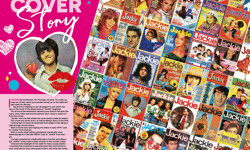
The PPA Awards in June was a busy night for Empire magazine.
Its December 2018 cover, featuring an image which summed up the most iconic movie moment of the year: the gloved hand of Thanos making the infamous ‘Snap’ at the end of Avengers: Infinity War, won the silver award for ‘Cover of the Year’ (voted by readers).
Bauer Media’s film magazine, which is marking its 30th birthday this year by celebrating the work of the 30 most adventurous filmmakers from the last three decades, also received the Chairman’s Award. The award was collected by the magazine’s dynamic editor-in-chief, Terri White, who has been at the helm for four years, since joining in September 2015 from Time Out New York.
White believes the magazine’s success is due in large part to its loyal readership. “I got word a little bit beforehand; they let you know so you can write a speech. I started to write a list of all the things we’d achieved: the first TV cover; the first European VR [virtual reality] issue. Then I thought the people this is really for is for the team and for the readers.”
“As publishers get hit harder, it’s more vital to centre the readers; they are so loyal and engaged. Our average subscriber has been with us for more than ten years. It’s a real testament to their commitment and love of Empire. Without them, we wouldn’t still exist.”
The circulation of Empire in the twelve months to the end of 2018 was just over 93,000 according to the Audit Bureau of Circulations, with more than 54,000 paid for subscriptions. So, who is the Empire reader? “The Empire readership is united by one thing: an absolute passion for film. They truly love film and have loved film since they were a kid. In their friendship group, they are known as the guy or girl with the film knowledge,” says White.
In testing times for glossy magazines, she believes: “First and foremost, it’s about staying true to who you are as a magazine and a brand, alongside constant innovation and staying relevant. The trick is to fundamentally remember who and what you are. We are still the world’s biggest film magazine and the people who can get you closer to the movies than any other magazine in the world.”
The ideal is you bounce your consumer around your brand, so they hit as many parts of your eco-system as possible.
Catering for different audiences
But White adds: “There’s a difference between the person who spends £5 on a film magazine and someone who looks at the website.” Under her leadership, Empire aims to cater for both these audiences. Her time as editor of Time Out New York, which has many different platforms including a magazine which she took free while she was there, gave her a keen awareness of how to work out what content is suited to what platform.
“If you are an Empire Online user, what is it you want from us digitally? You don’t just rip out articles from print and put them on the website. The print experience is immersive, kick back, photography made for paper; editorially you do long reads suited to the pace, rhythm and texture of print. It’s all about the content.”

An example of tailoring the content to the platform is the treatment given to the legendary filmmaker James Cameron, he of Titanic fame, as part of the Empire 30 series.
White explains: “We did an issue in print about his love of film-making, we spoke to his producer about their collaborative relationship and we also did readers’ questions with him, in which readers went to his house. When it came to online, we got one of the team to write a love letter to James Cameron. We then spoke to him for a deep dive podcast and we did a Movie Mastermind for video. That shows how you can commission multiple pieces of content that are suited to the platform. The ideal is you bounce your consumer around your brand, so they hit as many parts of your eco-system as possible.”
It is important to her not to use digital content simply to “flog the magazine”, but to ensure they are valuable pieces in their own right. One of the innovations Empire has become known for in recent years are its podcasts. The Empire podcast started seven years ago and now has 70-80,000 downloads a week, with up to 100,000 downloads for ‘Spoiler Specials’. An episode dedicated to Avengers: Infinity War, which simply featured a team sitting in an office discussing the film, got close to 350,000 downloads. Empire has branched out into live podcasts, which it has held in London and at the Glasgow Film Festival, and it is appearing at the London Podcast Festival this year. “The podcast has become such a cornerstone of the brand,” says White.
If it was just down to data, everyone could be a good editor.
TV cover
There was much excitement earlier this year when Empire produced its first ever TV cover, featuring Game of Thrones. The magazine’s readers were divided in their response. White says: “It’s always been accepted Game of Thrones is the only show you could do on the cover. It sold bang on target, but it did split people. People wrote to me who had never read Empire before. I got some more traditional readers who said I don’t want TV on the cover of my Empire. It’s not something we did lightly. It’s one of the most controversial things I’ve done as an editor anywhere. Does it in some way break a contract? As any big decision like that does, we’ve got a spectrum of reactions.” She adds: “This is not something we are going to repeat any time soon. Fundamentally Empire is a film magazine.”
But the magazine has had to deal with the fact that with the rise of cinematic television and immersive box-sets, there is now more cross-over between the worlds of film and TV. Empire’s response has been to launch a spin-off magazine, Pilot. The first issue was sold separately on the newsstand, but after receiving feedback from advertisers that they wanted access to the “Empire reach”, says White, it is now included with the main magazine.
“It’s about recognising how our world has changed, how film and TV has changed more than any other industry with streaming platforms, cinematic TV. The question was how do we talk about this? We are a film magazine, but we can’t ignore what’s happening elsewhere,” says White. There is also a Pilot podcast, which she describes as: “Myself, James Dyer and Boyd Hilton discussing TV news and reviews. No-one else is reviewing TV shows every week. That has become incredibly popular with 25-30,000 downloads per episode. It’s been really great to build that from scratch.”
The podcasts are all produced in Bauer Media’s internal studios, and so are cost effective. The main Empire podcast has been sponsored by The Economist and Sky Cinema, but although White concedes it would be nice to find a sponsor for the Pilot podcast in the future, for now she says: “It is just about getting an audience, so we are building in talent interviews and we are also looking at live podcasts as we’ve done with Empire.”
It is important not to use digital content simply to “flog the magazine”, but to ensure they are valuable pieces in their own right.
Keeping it relevant
It is not just the advent of cinematic television which is changing the film industry. The ‘Me Too’ movement has also had a massive impact, which White has been keen to reflect in the magazine’s pages.
She admits: “I was very concerned there was a view that Empire was for white men and not representative. I’ve worked really hard to make sure we have proper representation in terms of the people we feature in our pieces. We have featured more female film makers. We have a lot of stories on LGBTQ cinema to make sure we are not just the home of one kind of film maker. Our team of writers used to skew heavily male. We have invested in greater diversity in our team of freelancers. I don’t want anyone to feel that Empire isn’t for them.”
She adds: “People think ‘Me Too’ flipped a switch, but it has to start from the very beginning before you see the end. It’s not necessarily in what we say, it’s in what we do, behaving responsibly and not allowing female filmmakers and filmmakers of colour to be ghettoised when we look at what films we are going to cover, which directors we’re going to talk to. That doesn’t change what Empire does, if anything it makes it fresher.”
In today’s publishing world, editors cannot ignore data, but White insists: “Instinct is what most good editors are driven by. If it was just down to data, everyone could be a good editor. It’s about how to let that data guide you rather than drive you.” Covers featuring comic and superhero films and the big franchises such as Star Wars will always sell well, but she is not afraid to put more character and drama led films on the front, such as the new Tarantino movie.
White speaks of her readers with tremendous respect and it is a relationship she is keen to foster by putting her email address in the magazine and inviting readers to contact her directly by email, or social media.
She says: “Data allows you to see big trends, but there’s the humanity that feeds into your instinct and working out the nuances of it. Why do they prefer this cover to that cover? Fundamentally, an editor’s job is to know their reader better than anyone else in the world. You have to know their every desire, you have to know how they feel about any number of things; what makes them sad and happy and excited.” So far, it looks as though White is doing a pretty good job of knowing what makes Empire readers tick.
Fundamentally, an editor’s job is to know their reader better than anyone else in the world.
This article was first published in InPublishing magazine. If you would like to be added to the free mailing list, please register here.












